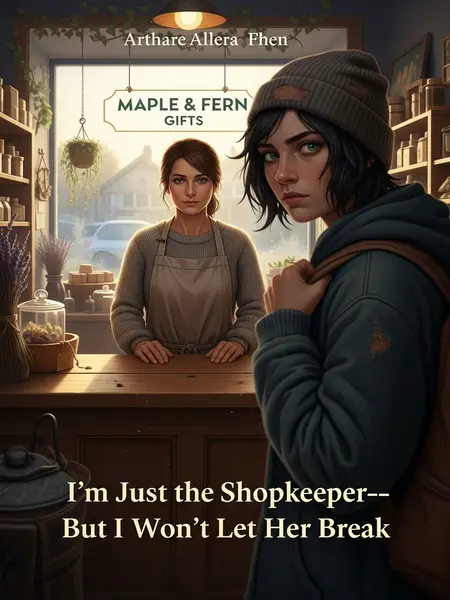Chapter 3: Sisters, Secrets, and Small Mercies
After I finished fixing Lexi’s hair, the story’s heroine—her sister, Sophia—came over too.
Sophia always had this calm, collected air—quiet, put-together, the kind of girl teachers trust with the classroom keys. She slipped in with a soft knock, her eyes flickering from me to her sister and back. There was a tension between them, a history you could feel humming in the air.
“Sorry to bother you. Thank you for looking after Lexi.”
Her voice was gentle, but there was something practiced in it, like she was used to patching things up. She reached into her wallet, counting out the exact change with careful fingers. I wondered how many times she’d played the peacemaker, trying to fix things with money she barely had.
She pulled out a handful of coins and tried to pay for her sister, looking everywhere but at Lexi.
But Lexi suddenly shoved her away, eyes red and brimming with resentment.
“I don’t need your fake kindness!”
Her words were sharp, but underneath, I could hear the hurt. Lexi’s hands trembled as she pushed her sister’s hand aside, her voice cracking. Sophia’s face fell, but she didn’t argue. She just looked at me, her eyes shining with guilt or maybe just plain exhaustion.
The barrage exploded.
[Told you she’s ungrateful!]
[There’s no saving the villainess. If I were their mom, I’d like the older sister and hate her too.]
For days after, Lexi didn’t show up. She seemed to be avoiding me—always sneaking in to drop off money when I was in the back room or busy with inventory, then bolting before I could say a word.
Sometimes I’d find a couple crumpled bills tucked under the register, or a handful of coins stacked neatly beside the hair ties. She was like a ghost—there and gone before I could catch her. I started leaving little notes: “Thanks, Lexi! Hope you’re having a good day.” She never replied, but the money kept coming.
It added up to nearly twenty bucks. She was paying me back for the hair clips, little by little, scraping together lunch money to do it.
I did the math one night, counting out the bills and realizing just how long it must’ve taken her to save up. My heart ached—so stubborn, so determined to pay her own way even when the world seemed stacked against her. I tucked the money into a special envelope, planning to give it back when she was ready.
Finally, one day, I pretended to nap at the counter, waiting for her so I could ask what was going on.
I heard the door creak, soft sneakers on the floor. I kept my eyes half-closed, listening as she tiptoed to the counter. When she thought I was asleep, she slid a few bills under the register and turned to leave. I sat up, rubbing my eyes. “Hey, Lexi. Got a minute?”
“Why are you hiding from me?”
“I’m not.” She blurted it out, almost automatically, then hesitated like she wanted to say more. When she saw I was genuinely just confused, she looked puzzled herself.
She hovered in the doorway, backpack slung over one shoulder, biting her lip. “I just… I thought maybe you’d be mad. Or that you’d think I was taking advantage.” Her voice was soft, almost scared. I shook my head, smiling gently, letting her know I wasn’t angry.
“Don’t you hate me? Everyone who’s met my sister ends up hating me.”
In her mind, her sister was quiet, beautiful, and smart—everyone liked her, but not Lexi. They thought she was pushy, had a bad temper, and was unreasonable.
She said it like it was just a fact of life. I wanted to tell her it wasn’t true, that she was more than everyone else’s opinions. But I knew she wouldn’t believe me—at least, not yet.
If her sister wanted to join a test-prep class, their mom would cut off Lexi’s hair to sell it and use the money for her sister’s tuition. That’s why she got so upset when she saw her sister pulling out money to pay last time.
“She always says she doesn’t want anything, but everyone gives her what she wants anyway. I have nothing, but I’m always blamed for wanting too much.”
But honestly, I could tell she didn’t really hate her sister. Whenever she saw something cute in my shop—hair clips, pretty notebook covers—she’d buy two, one for each of them. After night classes, her sister would quietly wait by the door, fiddling with a little hourglass from the display, waiting for her to finish playing so they could go home together.
I’d watch them sometimes, the way Sophia would stand just outside the glow of the shop window, patient and quiet, while Lexi tried out every pen and sticker in the store. It was their little ritual, silent but full of meaning. I wondered if they realized how much they meant to each other, or if they were too busy being angry to see it.
But when I offered Sophia the hourglass, she’d always smile and shake her head. Lexi would make faces behind her back, mouthing: “See? Told you. Sis never wants anything.”
It became our running joke—me offering, Sophia refusing, Lexi rolling her eyes and sticking out her tongue. For a moment, they were just two sisters, no drama, no rivalry, just the easy teasing of people who know each other’s secrets.
“No-Thanks Sis”—that’s what Lexi called Sophia.
Unlike her sister’s easy warmth, Sophia was always polite but distant, even though she’d visited my shop plenty of times. If her sister wasn’t around, she’d almost never come in on her own.
I sometimes wondered what Sophia was thinking as she browsed the shelves, hands always neat, hair always in place. There was a sadness to her—a kind of loneliness that matched Lexi’s, just in a quieter way. Maybe that’s why she always waited for her sister—maybe she needed her just as much.













